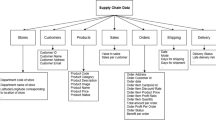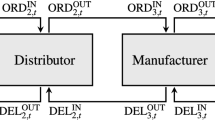Abstract
We propose generalizations of a broad class of traditional supply chain planning and logistics models that we call supply chain planning and logistics problems with market choice. Instead of the traditional setting, we are given a set of markets, each specified by a sequence of demands and associated with a revenue. Decisions are made in two stages. In the first stage, one chooses a subset of markets and rejects the others. Once that market choice is made, one needs to construct a minimum-cost production plan (set of facilities) to satisfy all of the demands of all the selected markets. The goal is to minimize the overall lost revenues of rejected markets and the production (facility opening and connection) costs. These models capture important aspects of demand shaping within supply chain planning and logistics models. We introduce a general algorithmic framework that leverages existing approximation results for the traditional models to obtain corresponding results for their counterpart models with market choice. More specifically, any LP-based α-approximation for the traditional model can be leveraged to a \({\frac{1}{1-e^{-1/\alpha}}}\) -approximation algorithm for the counterpart model with market choice. Our techniques are also potentially applicable to other covering problems.
Similar content being viewed by others
References
Aggarwal A., Park J.K.: Improved algorithms for economic lot-sizing problems. Oper. Res. 14, 549–571 (1993)
Arkin E., Joneja D., Roundy R.: Computational complexity of uncapacitated multi-echelon production planning problems. Oper. Res. Lett. 8, 61–66 (1989)
Balas E.: The prize collection travelling salesman problem. Networks 19, 621–636 (1989)
Bárány I., Van Roy T.J., Wolsey L.A.: Uncapacitated lot-sizing: the convex hull of solutions. Math. Program. Study 22, 32–43 (1984)
Bartal Y., Leonardi S., Spaccamela A.M., Sgall J., Stougie L.: Multiprocessor scheduling with rejection. SIAM J. Discret. Math. 13, 64–78 (2000)
Bertsimas D., Teo C., Vohra R.: On dependent randomized rounding algorithms. Oper. Res. Lett. 25, 105–114 (1999)
Bienstock D., Goemans M.X., Simchi-Levi D., Williamson D.: A note on the prize collecting traveling salesman problem. Math. Program. 59, 413–420 (1993)
Byrka, J.: An optimal bifactor approximation algorithm for the metric uncapacitated facility location problem. In: Proceedings of APPROX-RANDOM, pp. 29–43 (2007)
Chan A., Muriel A., Shen Z.-J., Simchi-Levi D., Teo C.-P.: Effectiveness of zero inventory ordering policies for an one-warehouse multi-retailer problem with piecewise linear cost structures. Manage. Sci. 48, 1446–1460 (2000)
Charikar, M., Khuller, S., Mount, D.M., Narasimhan, G.: Algorithms for facility location problems with outliers. In: Proceedings of the 12th Annual ACM-SIAM Symposium on Discrete Algorithms, pp. 642–651 (2001)
Chudak, F.A., Shmoys, D.B.: Improved approximation algorithms for the capacitated facility location problem. In: Proceedings of the 10th Annual ACM-SIAM Symposium on Discrete Algorithms, pp. S875–S876, (1999)
Federgruen A., Tzur M.: A simple forward algorithm to solve general dynamic lot-sizing models with n periods in O(n log n) or O(n) time. Manage. Sci. 37, 909–925 (1991)
Feige U.: A threshold of ln(n) for approximating set-cover. J. ACM 45, 634–652 (1998)
Geunes J., Romeijn H.E., Taaffe K.: Requirements planning with order selection flexibility. Oper. Res. 54, 394–401 (2006)
Goemans, M.X.: Approximate solutions of hard combinatorial problems, Lecture notes in the school of ASHCOMP (1996)
Goemans M.X., Williamson D.P.: A general approximation technique for constrained forest problems. SIAM J. Comput. 24, 296–317 (1995)
Hoesel A.V., Wagelmans A., Kolen A.: A dual algorithm for the economic lot-sizing problem. Eur. J. Oper. Res. 52, 315–325 (1991)
Krarup, J., Bilde, O.: Plant location, set covering and economic lot sizing: an O(mn) algorithm for structured problems. In: Numerische Methoden Bei Optimierungsaufgaben, vol. 3, pp. 155–180 (1977)
Levi, R., Geunes, J., Romeijn, E.H., Shmoys, D.B.: Inventory and facility location models with market selection. In: Proceedings of the 12th IPCO, pp. 111–124, (2005)
Levi R., Roundy R.O., Shmoys D.B.: Primal-dual algorithms for deterministic inventory problems. Math. Oper. Res. 31, 267–284 (2006)
Levi R., Roundy R.O., Shmoys D.B., Sviridenko M.: A constant approximation algorithm for the one-warehouse multi-retailer problem. Manage. Sci. 54, 763–776 (2008)
Magnanti, T.L., Stratila, D.: Separable concave optimization approximately equals piecewise linear optimization. In: Proceedings of the 11th IPCO, pp. 234–243 (2004)
Magnanti, T.L., Stratila, D.: Strongly polynomial algorithms for concave cost combinatorial optimization problems. (2007) (in preparation)
Müller A., Stoyan D.: Comparison Methods for Stochastic Models and Risks. Wiley, London (2002)
Pochet Y., Wolsey L.A.: Lot-sizing with constant batches: formulation and valid inequalities. Math. Oper. Res. 18, 767–785 (1993)
van den Heuvel, W., Kundakcioglu, O.E., Geunes, J., Romeijn, H.E., Sharkey, T.C., Wagelmans, A.P.M.: Integrated market selection and production planning: complexity and solution approaches. Unpublished manuscript (2009)
Wagelmans A.P.M., van Hoesel C.P.M., Kolen A.: Economic lot-sizing: An O(n log n) algorithm that runs in linear time in the Wagner-Whitin case. Oper. Res. 40, 145–156 (1992)
Wagner H.M., Whitin T.M.: Dynamic version of the economic lot sizing model. Manage. Sci. 5, 89–96 (1958)
Author information
Authors and Affiliations
Corresponding author
Additional information
The work of J. Geunes was supported by the National Science Foundation under Grants No. DMI-0322715 and DMI-0355533. Part of this work was done while R. Levi was a PhD student at the ORIE Department in Cornell University. The work of R. Levi was supported in part by NSF grants DMS-0732175 and CMMI-0846554 (CAREER Award), an AFOSR award FA9550-08-1-0369, an SMA grant and the Buschbaum Research Fund of MIT and by Motorola. The work of H. E. Romeijn was supported by the National Science Foundation under Grant No. DMI-0355533. The work of D. B. Shmoys was supported in part by the National Science Foundation under Grants No. CCR-0635121, DMI-0500263, DMS-0732196, and CCF-0832782.
Rights and permissions
About this article
Cite this article
Geunes, J., Levi, R., Romeijn, H.E. et al. Approximation algorithms for supply chain planning and logistics problems with market choice. Math. Program. 130, 85–106 (2011). https://doi.org/10.1007/s10107-009-0310-9
Received:
Accepted:
Published:
Issue Date:
DOI: https://doi.org/10.1007/s10107-009-0310-9




